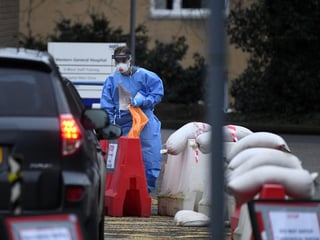Edinburgh may miss its tourists if coronavirus gets worse – Ian Johnston


Over-tourism is a product of globalisation. The fact that it is simple and relatively cheap to fly from one part of the world to another means huge numbers of people can choose to go to a particular part of it.
Machu Picchu, one of the great wonders of the world, was once a place only a few people were able to visit. Now thousands of people walk the paths up to the ancient Inca sanctuary, high in the Andes, every day during the peak months. According to Unesco, “tourism itself represents a double-edged sword by providing economic benefits but also by resulting in major cultural and ecological impacts” to the site.
Advertisement
Hide AdAdvertisement
Hide AdThere are people in Edinburgh and many other cities around the world who will be nodding their heads vigorously in agreement with this statement. Apparently locals in Venice are sometimes asked by tourists what time the city closes, as if it wasn’t a real place, but a Disney-style theme park. This is a question that might be making its debut in Edinburgh sometime soon – unless the coronavirus outbreak becomes more serious.
In that case, the restrictions imposed on travel in places like northern Italy might – might – be required here too. If so, the city’s tourist economy could tak a serious hit. The potential effect of the outbreak is demonstrating just how much we depend on our ‘globalised’ world. Any disruption to the movement of people and goods is extremely bad news for the economy as shown by dramatic falls in share prices. One analyst described trading in the UK yesterday as “utter carnage”.
It is clear that investors are rather nervous about what might happen to the value of their holdings, but then such people usually are when major change looms. It is easy to buy and sell shares and you might just make a lot of money – or lose a lot – depending on what you decide. Most people would be a bit ‘flighty’ in such circumstances.
However, the rest of us should avoid catching the contagion of such panicky decision-making. Being a good citizen, a good person, is about making calm, reasoned decisions in the best interests of not just ourselves, but the people around us.
Advertisement
Hide AdAdvertisement
Hide AdIt looks likely that the UK will need to increase the measures it has been taking to prevent a major outbreak. If this happens, there is likely to be disruption to our everyday lives and to the usual patterns of business. This may affect us as individuals, but also as a city, a nation and even as a world.
So we should concentrate on what is most important – each other – and remember that we are all in it together. And the “all” in that sentence is the world. A virus has no nationality and will not stop at any borders, something that the racist idiots who have been attacking people they think might have some connection with China should perhaps consider (particularly given its population is nearly 1.4 billion people, about double the figure for the whole of Europe).
The truth is the world has always been a ‘globalised’ one, for all the barriers we humans have put in place. Hospitality was considered an almost sacred duty in many ancient cultures, such as Greece. The Greek word for hospitality, philoxenia, literally means “friend to the stranger”. As the world faces a global problem, we should remember the importance of being kind to strangers, whether they are from Glasgow, London or a country far away.
